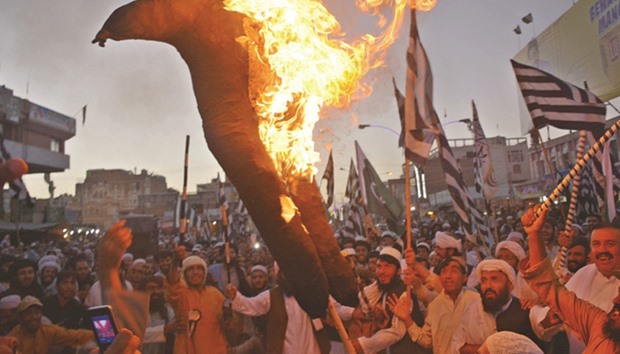Amid growing tensions between New Delhi and Islamabad, Pakistan’s National Security Advisor Nasir Janjua briefed Prime Minister Nawaz Sharif over the situation at the Line of Control (LoC).
Janjua presented Sharif a detailed report over the border clashes between Pakistan and India along the LoC and arrangements to foil “any enemy attack”, an official statement said.
The government has dismissed Indian claims of carrying out ‘surgical strikes’ in Pakistan-ruled Kashmir but confirmed that two of its soldiers were killed when the Indian military resorted to firing across the LoC.
Meanwhile following the Indian claims of “surgical strikes”, opposition party leader Imran Khan said he will show Prime Minister Nawaz Sharif how to react to such “aggressions”.
“Initially I had to give a message to Nawaz Sharif, but tomorrow I will send a message to Modi too,” the cricketer-turned politician said.
Khan also urged people to participate in the march planned by his party. “People from all over Pakistan should participate in the march to display unity,” he said, adding that “I will show Sharif how to respond to Modi”.
The Pakistan Tehreek-i-Insaf chief also referred to Nawaz Sharif’s “inability to govern” and said, “(army chief) Gen Raheel is representing the nation.”
The Pakistan Foreign Office summoned Indian High Commissioner Gautam Bambawale over the “unprovoked” cross-border firing by Indian Army.
According to Foreign Office sources, Pakistan “strongly” condemned the firing, Geo TV reported.
Foreign Secretary Aizaz Chaudhry handed over the protest note to Bambawale, sources said.
The Foreign Office, in a statement, strongly condemned the “unprovoked ceasefire violations at LoC by Indian forces”, which it termed as “a continuation of a pattern of ceasefire violations committed by the Indian forces”.
It said that “any such aggression will not go unanswered or unpunished”.
Earlier, the US has urged India and Pakistan to tone down their rhetoric, reminding them for the third time in three days that better relations between the two nations will benefit the entire region.
The latest appeal for peace came after India announced that it would not attend the 19th summit of the South Asian Association for Regional Co-operation (Saarc) in Islamabad in November.
Although the US state department’s deputy spokesman Mark Toner refused to comment on India’s decision, he did ask the two countries to stop their back and forth rhetoric.
“It’s not for us, necessarily, to offer a prescription (to India and Pakistan but) we want to see a de-escalation and that’s, obviously, facts on the ground or actions on the ground, but also applies to the rhetoric that’s flying back and forth,” he said.
The US official noted that it was in the two countries’ mutual interest to put aside tensions, de-escalate and establish normal channels of communication.
Since September 18, when 18 Indian soldiers were killed in a militant attack on an army base in the town of Uri in India-held Kashmir, the US has been regularly urging the two nations not to allow the incident to further deteriorate their already tense relations.
India, however, used the incident to launch a major diplomatic offensive aimed at isolating Pakistan.
At a Tuesday afternoon news briefing in Washington, journalists sought Toner’s views on the developments but the US official refused to blame either India or Pakistan for the current situation and instead urged both to de-escalate tensions.
“More broadly we want to see closer relations and a normalisation of relations between India and Pakistan. It would be to the benefit of the region,” he said.
“And we want to see de-escalation in the political discourse between the two countries and greater communication and coordination between them,” he added.
“I’m not sure what your reference is,” replied Toner when an Indian journalist asked if “talks and terror can go together simultaneously.”
He noted that Pakistan had made progress in the fight against the terrorist groups that attacked targets within its borders, but urged it to go after other groups as well.
“We continue to put pressure on Pakistan to respond to those groups who are ‘seeking safe haven on Pakistan’s borders,’ that’s who are intent on carrying out attacks elsewhere in the region,” he said.
At the White House, press secretary Josh Earnest urged India and Pakistan to “resolve the differences peacefully and through diplomacy”.
Asked at a news briefing on what the US thinks of the current situation in South Asia, now that India has pulled out from the Saarc summit, he said, “The United States has continued to encourage India and Pakistan to find a way to resolve their differences peacefully and through diplomacy. And we have condemned violence, particularly terrorist attacks.”
The US, he said, would “continue to be hopeful” and encourage both sides to find a way to resolve their differences and to reduce tensions through diplomacy and without resorting to violence.

Supporters of the Jamiat Ulema-i-Islam-Nazaryati (JUI-N) party burn an effigy of Indian Prime Minister Narendra Modi during a demonstration in Quetta yesterday. Prime Minister Nawaz Sharif condemned the u201cnaked aggression of Indian forcesu201d yesterday after two Pakistani soldiers were killed in firing along the Line of Control.
